
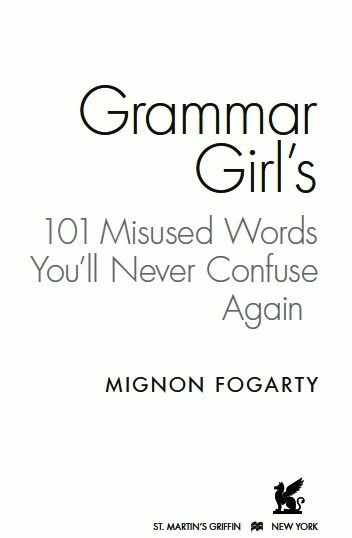 Contents Introduction Ah, English. We have so many words that sound alike but mean different things or take on meanings that dont make sense that its hard to keep it all straight. Further (or is it farther? youll find out!), once some people start using a word incorrectly, that use can spread to a point where theres an all-out battle between the people who support what the word is supposed to mean and the masses who think it should mean something else. Sadly, the masses are often unaware that they are even the target of a stickler war. Yet, target they are, and sticklers who will judge you for using the wrong word are lurking everywherein your school, your workplace, your family, and your favorite Internet hangout. A dirty little secret you can invoke to keep you sane is that there are so many confusing words that everyone is part of the confused masses for at least a few of them.
Contents Introduction Ah, English. We have so many words that sound alike but mean different things or take on meanings that dont make sense that its hard to keep it all straight. Further (or is it farther? youll find out!), once some people start using a word incorrectly, that use can spread to a point where theres an all-out battle between the people who support what the word is supposed to mean and the masses who think it should mean something else. Sadly, the masses are often unaware that they are even the target of a stickler war. Yet, target they are, and sticklers who will judge you for using the wrong word are lurking everywherein your school, your workplace, your family, and your favorite Internet hangout. A dirty little secret you can invoke to keep you sane is that there are so many confusing words that everyone is part of the confused masses for at least a few of them.
Many times Ive corrected a stickler who actually had something wrong, and Ive heard a literate, well-educated person say, What do you know? I never knew that! in response to one of my tips. Ive also made mistakes myselffor example, I grew up saying snuck instead of sneaked and didnt know it was controversial until someone corrected me and I looked it up myself. So dont be ashamed if you get confused. The only reason to be ashamed is if you are too lazy to find out what is right once you suspect you might be wrong. In this book, Ive highlighted 101 troublesome words that people often confuse, and Ive tried to give you fun and easy ways to remember what they mean. Since theyre usually problematic word pairs, youre actually getting tips for almost 200 words.
Quite a bonus for a book titled 101 Words, eh?  A Versus An Sadly, a lot of people were taught the wrong rule for using the articles a and an. Its the sound of the next word that determines the word choice, not the first letter. If the next word starts with a vowel sound, use an. If the next word starts with a consonant sound, use a. That means a word starting with u or o, for example, can require a or an depending on the pronunciation: a unicorn, an uncle, a onetime deal, an owner. QUICK AND DIRTY TIP To remember that words starting with certain letters can go either way, set the image in your mind of a man playing a ukulele under an umbrellaan image that uses two u-words that require different articles.
A Versus An Sadly, a lot of people were taught the wrong rule for using the articles a and an. Its the sound of the next word that determines the word choice, not the first letter. If the next word starts with a vowel sound, use an. If the next word starts with a consonant sound, use a. That means a word starting with u or o, for example, can require a or an depending on the pronunciation: a unicorn, an uncle, a onetime deal, an owner. QUICK AND DIRTY TIP To remember that words starting with certain letters can go either way, set the image in your mind of a man playing a ukulele under an umbrellaan image that uses two u-words that require different articles.
Adieu Versus Ado Every time I use the word ado in a Scrabble game with my husband, he insists its not a word. He is wrong, but hes not alone. People often incorrectly write without further adieu instead of the proper phrase without further ado. Adieu is a French word meaning farewell. Its just another way to say good-byelike adios or ciao. To mean good-bye is how Julie Andrews used adieu in the song So Long, Farewell in The Soundof Music. An ado, on the other hand, is a hubbub, bustle, flurry, or fuss. You may remember the word ado from the title of Shakespeares comedy Much Ado About Nothing, in which a big fuss (an ado) is made about an affair that didnt happen.
In some instances, it is understandable that people could mistakenly believe the meaning of adieu makes sense in without further adieu. For example, if dinner guests want to leave without further excessive farewells, it may seem logical to say something such as Without further adieu, were off to the movies. Logical, but incorrect. If that is your sentiment, you need to use the plural: adieus. Advice Versus Advise The main difference between advice and advise is that advice is a noun and advise is a verbthe act of giving advice. You once told me, dont get emotional about stock.
Dont! The bid is 16 and going down. As your broker,I advise you to take it. Charlie Sheen playing Bud Fox in the movie Wall StreetAdvice, meaning an opinion about what should be done, is an abstract noun. It isnt something solid you can see, but its a noun nonetheless. Other abstract nouns include courage and loyalty. Let me give you a nickels worth of free advice young man. This so-called Dr.
Brown is dangerous; hes areal nutcase. You hang around with him, youre gonna end up in big trouble. James Tolkan playing Mr. Strickland in the movie Back to the FutureQUICK AND DIRTY TIPAdvice ends in ice, and its easy to remember that a block of ice is a noun. (Even though the ice in advice has nothing to do with frozen water, thinking of it that way can help you remember which word to use.) Aesthetics Versus Ascetics Ascetics are people who live an extremely simple life, usually characterized by the rejection of material possessions and worldly pleasures. Ascetic is related to the Greek name for a monk or a hermit ( askts) and the Greek word meaning to exercise or train ( askein). Throughout history power has been the vice of the ascetic. Bertrand Russell, a British philosopher The concept of aesthetics is a bit more difficult to define but generally relates to beauty or how something affects the senses.
For example, a room can have good aesthetics or bad aesthetics. Aesthetics is also a branch of philosophy that considers such things. Most people probably wouldnt be pleased with the aesthetics of an ascetics home. You may sometimes see the word spelled esthetics. That spelling is considered an acceptable variant in American English, but aesthetics is still the standard spelling in Britain and the preferred spelling in America. Dont talk to me about aesthetics or tradition.
Talk to me about what sells and whats good right now. George Steinbrenner, former owner of the New York Yankees 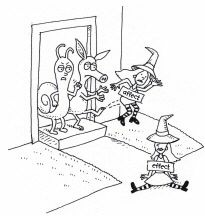 Affect Versus Effect Most of the time, affect is a verb and effect is a noun. Affect most commonly means something like to influence or to change. Affect can also mean, roughly, to act in a way you dont feel, as in He affected an air of superiority. Id like to see some sign that it affects you or that you recognize that it affects other people. Omar Epps playing Dr. Eric Foreman in the TV show HouseEffect has a lot of subtle meanings as a noun, but to me the meaning a result seems to be at the core of all the definitions. When I see effects and Im unable to discern the cause, my faith in reason and consequence is shaken. Emily Deschanel playing Dr.
Affect Versus Effect Most of the time, affect is a verb and effect is a noun. Affect most commonly means something like to influence or to change. Affect can also mean, roughly, to act in a way you dont feel, as in He affected an air of superiority. Id like to see some sign that it affects you or that you recognize that it affects other people. Omar Epps playing Dr. Eric Foreman in the TV show HouseEffect has a lot of subtle meanings as a noun, but to me the meaning a result seems to be at the core of all the definitions. When I see effects and Im unable to discern the cause, my faith in reason and consequence is shaken. Emily Deschanel playing Dr.
Temperance Brennan in the TV show Bones In rare instances, the roles are switched. For example, you can effect change (a verb) and display a happy affect (a noun). (In the latter case, affect means an emotion or dispositionshown either on your face or in your body language. QUICK AND DIRTY TIPAffect is usually an action (both start with a). Like most nouns, you can usually put an article ( the or an) in front of effect without ruining the meaning of the sentence. Affective Versus Effective Even when people understand the difference between affect and effect, they often still get confused about
Next page

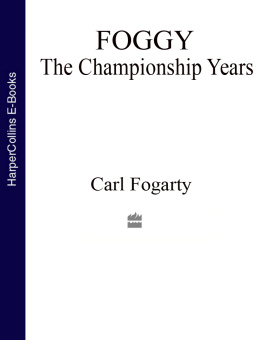

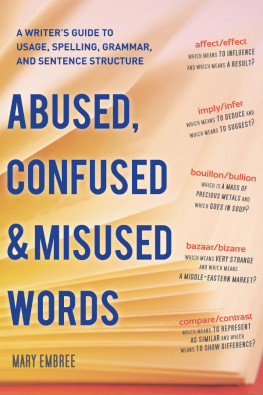

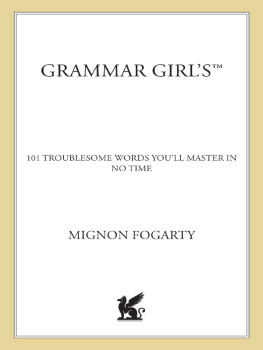
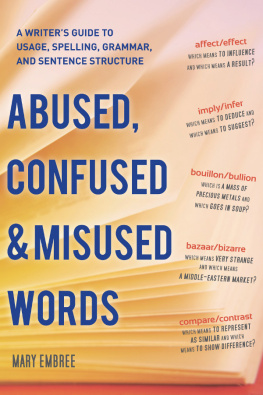
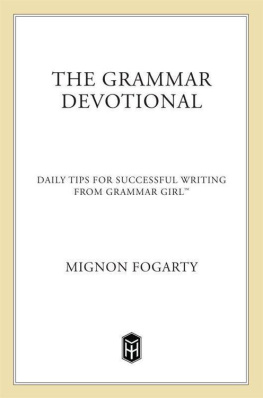

 Contents Introduction Ah, English. We have so many words that sound alike but mean different things or take on meanings that dont make sense that its hard to keep it all straight. Further (or is it farther? youll find out!), once some people start using a word incorrectly, that use can spread to a point where theres an all-out battle between the people who support what the word is supposed to mean and the masses who think it should mean something else. Sadly, the masses are often unaware that they are even the target of a stickler war. Yet, target they are, and sticklers who will judge you for using the wrong word are lurking everywherein your school, your workplace, your family, and your favorite Internet hangout. A dirty little secret you can invoke to keep you sane is that there are so many confusing words that everyone is part of the confused masses for at least a few of them.
Contents Introduction Ah, English. We have so many words that sound alike but mean different things or take on meanings that dont make sense that its hard to keep it all straight. Further (or is it farther? youll find out!), once some people start using a word incorrectly, that use can spread to a point where theres an all-out battle between the people who support what the word is supposed to mean and the masses who think it should mean something else. Sadly, the masses are often unaware that they are even the target of a stickler war. Yet, target they are, and sticklers who will judge you for using the wrong word are lurking everywherein your school, your workplace, your family, and your favorite Internet hangout. A dirty little secret you can invoke to keep you sane is that there are so many confusing words that everyone is part of the confused masses for at least a few of them. A Versus An Sadly, a lot of people were taught the wrong rule for using the articles a and an. Its the sound of the next word that determines the word choice, not the first letter. If the next word starts with a vowel sound, use an. If the next word starts with a consonant sound, use a. That means a word starting with u or o, for example, can require a or an depending on the pronunciation: a unicorn, an uncle, a onetime deal, an owner. QUICK AND DIRTY TIP To remember that words starting with certain letters can go either way, set the image in your mind of a man playing a ukulele under an umbrellaan image that uses two u-words that require different articles.
A Versus An Sadly, a lot of people were taught the wrong rule for using the articles a and an. Its the sound of the next word that determines the word choice, not the first letter. If the next word starts with a vowel sound, use an. If the next word starts with a consonant sound, use a. That means a word starting with u or o, for example, can require a or an depending on the pronunciation: a unicorn, an uncle, a onetime deal, an owner. QUICK AND DIRTY TIP To remember that words starting with certain letters can go either way, set the image in your mind of a man playing a ukulele under an umbrellaan image that uses two u-words that require different articles. Affect Versus Effect Most of the time, affect is a verb and effect is a noun. Affect most commonly means something like to influence or to change. Affect can also mean, roughly, to act in a way you dont feel, as in He affected an air of superiority. Id like to see some sign that it affects you or that you recognize that it affects other people. Omar Epps playing Dr. Eric Foreman in the TV show HouseEffect has a lot of subtle meanings as a noun, but to me the meaning a result seems to be at the core of all the definitions. When I see effects and Im unable to discern the cause, my faith in reason and consequence is shaken. Emily Deschanel playing Dr.
Affect Versus Effect Most of the time, affect is a verb and effect is a noun. Affect most commonly means something like to influence or to change. Affect can also mean, roughly, to act in a way you dont feel, as in He affected an air of superiority. Id like to see some sign that it affects you or that you recognize that it affects other people. Omar Epps playing Dr. Eric Foreman in the TV show HouseEffect has a lot of subtle meanings as a noun, but to me the meaning a result seems to be at the core of all the definitions. When I see effects and Im unable to discern the cause, my faith in reason and consequence is shaken. Emily Deschanel playing Dr.